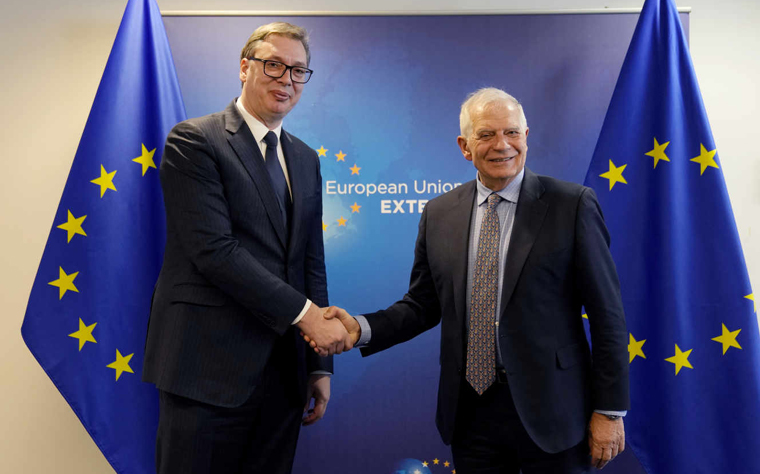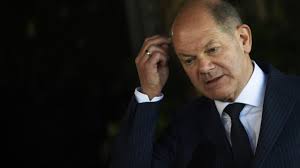
BRUSSELS, Feb 28 (NNN-AGENCIES) — The European Union published its peace plan for Serbia and Kosovo on Monday, ramping up pressure on their leaders to come to a deal after tense talks in Brussels ended without a clear breakthrough.
EU foreign policy chief Josep Borrell said a next meeting with Kosovo’s Prime Minister Albin Kurti and Serbian President Aleksandar Vucic would take place in March and focus on how to implement the plan.
“Progress was made today, and I commend the parties for their engagement,” Borrell said — appearing before reporters alone without the Kosovo and Serbian leaders, and taking no questions.
“At the same time, more work is needed to ensure that what was accepted today by the parties will be implemented,” he said, promising that EU envoy Miroslav Lajcak would continue “shuttle diplomacy” between Belgrade and Pristina in the coming weeks.
Serbia refuses to recognise the unilateral declaration of independence Kosovo made in 2008, and bouts of unrest erupt between local authorities and the Serb minority in the former breakaway province.
The latest round of talks followed months of shuttle diplomacy, nearly 25 years after the war between ethnic Albanian insurgents and Serb forces triggered a NATO bombing campaign that ended the fighting.
Even before Monday’s meeting talks, a senior European diplomat said the parties had already accepted the then-unpublished European plan, and that Monday’s meeting was to discuss implementation.
However, afterwards Kurti and Vucic blamed each other for the meeting ending in acrimony.
Nevertheless, Borrell’s office published the previously secret European peace plan, drawn up in Paris and Berlin but now, he said, backed by all 27 EU members — which hold the key to both Pristina and Belgrade’s hopes to one day join the bloc.
The 11-point document notably says, without prejudicing recognition of each other’s status, that neither side will resort to violence to resolve a dispute, nor seek to prevent the other from joining the EU or other international bodies — a key demand from Kosovo.
“The parties shall develop normal, good-neighbourly relations with each other on the basis of equal rights. Both parties shall mutually recognise their respective documents and national symbols, including passports, diplomas, licence plates, and customs stamps,” according to Article 1.
“Serbia will not object to Kosovo’s membership in any international organisation,” Article 4 says.
The plan, however, also calls on both parties “to ensure an appropriate level of self-management for the Serbian community in Kosovo and ability for service provision in specific areas, including the possibility for financial support by Serbia.”
Pristina has been reluctant to allow majority Serbian municipalities inside Kosovo to unite in a Belgrade-backed association, fearing the creation of a breakaway enclave that would undermine its sovereignty.
The EU is now pushing the idea as part of its plan.
Afterwards, Vucic poured cold water on hopes for a quick implementation, addressing his domestic media to stress he was not making concessions, despite strong pressure from Europe and the US to come to an agreement.
“It’s good that we talked and I believe we will be able to overcome unilateral moves which would endanger the safety of the people on the ground,” Vucic said.
He dismissed the talks as “nothing special” and, while he agreed to continue negotiations, he insisted: “We don’t have a roadmap, people, we don’t. We need to sit and work on the roadmap.”
Kurti was more positive, and said he would have been ready to sign an agreement if Vucic had been.
“The agreement fully establishes equality between the parties, symmetry and good neighbourliness,” he said. “I believe that we are on a right track for the normalisation of relations with Serbia and on a one-way path to good European neighbourliness.”
Vucic said he had insisted on the need for the association of Serb municipalities within Kosovo, and would not budge on recognising Kosovo documents until this came about.
Borrell said the next talks would be in mid to late March and predicted success before the next EU leaders’ summit. Vucic suggested they would be on March 18, in North Macedonia.
Kurti hopes that a deal would pave the way for Kosovo’s entry into several international institutions, a long-sought goal for the government in Pristina.
On the other side, Serbia’s Vucic has said his government is under intense pressure to come to an understanding, while insisting to his domestic opponents that he will not give ground.
During Monday’s talks, Vucic posted a picture to social media of him sitting opposite Kurti, smiling to the camera while Borrell slumped, his head in his hands.
“Rough meeting. Expected. No surrender,” the caption read. — NNN-AGENCIES





